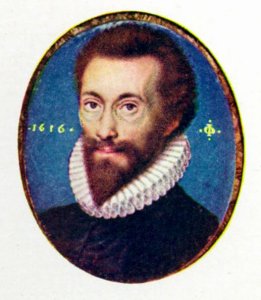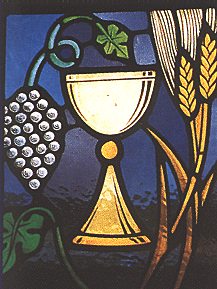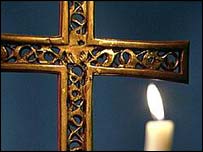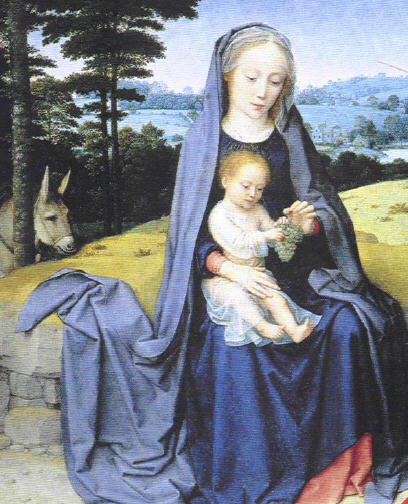 | ||||||
JOHN DONNE 1571/2 - 1631
THE PASTOR OF SOULS
Born into a Catholic family just two years after Pope Pius V had excommunicated Elizabeth I in 1570, the Donne family faced all the dilemmas that imposed. Until then those who still worshipped the old way were not troubled providing they were loyal to the Supreme Governor of the Church. Elizabeth had made it clear she had no desire to look into people’s souls. Now that changed. The old Catholics became known as Papists and they were forced to choose between Queen or Pope. Indeed Donne’s brother, Henry, died in prison after his arrest for giving sanctuary to a priest. As John discovered he could not graduate from Cambridge as he refused to take the Oath of Supremacy and went on to study Law at Lincoln’s Inn. However it was nigh impossible to obtain a position of any rank as a Catholic.
GOD’S MERCY AND OUR JOY
SALVATION
Begin where you will at any act in yourself, at any act in God, yet there was mercy before that, for His mercy is eternal, eternal even towards you. ... Earth cannot receive, heaven cannot give such another universal soul to all: all persons, all actions, as mercy. And were I the child ... who were to live an hundred years, I would ask no other marrow to my bones, no other wine to my heart, no other light to my eyes, no other art to my understanding, no other eloquence to my tongue, than the power of apprehending for myself, and the power of deriving and conveying upon others by my ministry, the mercy, the early mercy, the everlasting mercy of yours, and my God.
PREACHING AGAINST REPROBATION AND PREDESTINATION
Living at a time when the Calvinistic doctrine of predestination was popular, Donne insisted God "gives none of His ministers leave to say to any man, you are not redeemed, [or] does He give [the] wounded [or] afflicted conscious leave, to say to itself, I am not redeemed." The Gospel states clearly "He came to save; and whom? Sinners. Those, who the more they acknowledge themselves to be so, the nearer they are to this salvation." Consequently the pastor must bring "the comfortable promises of the Gospel," especially to those "who groan under the burden of their sins", and "break ... that heart that is stubborn" so that it can "fix itself upon the merits and mercies of Christ Jesus." Therefore "our instructions are to preach ... repentance" which is the Gospel, while "the seal is the administration of the Sacraments", both of which are "necessary for salvation." For those who doubt whether God will forgive their "relapses into sins repented, ... faint repentances, ... sinful thoughts, ... blasphemous words ... [and] sins against their neighbour, ... and self," Donne assured them He does, "otherwise His mercy endures not for ever." Yet he warned that "salvation is ... endangered when we make only "half-repentances," and do not repent "those sins, which offer themselves to our knowledge, and memory." There is only one true repentance, that is, "to bewail our sins, and forbear the sins we have bewailed." Yet once one has repented, the way to salvation was clear for God. He "has opened a pool of Bethesda to all, where not only he who comes at first, but he who comes even at last, he who comes washed with the water of baptism in his infancy, and he who comes washed with the tears of repentance in his age, may receive health and cleanness.” Thus “when God bids you rise from your sins, say not ... it is too late, because when He bids you rise, He enables you to rise ... by the power of that will which only His mercy and ... grace has created in you.”
Preaching against reprobation, Donne insisted:
If we shall say, that God's first string in His instrument, was reprobation, that God's first intention was for His glory to damn man; and that then He put in another string, of creating man, that so He might have somebody to damn; and then another of enforcing him to sin, that so He might have a just cause to damn him; and then another, of disabling him to lay hold upon any means of recovery: there is no music in all this, no harmony, no peace in such preaching.
The truth is that "God is loathe to lose us." Moreover "men are weary of hearing any other thing, than election and reprobation, and whom, and when, and how, and why God has chosen, or cast away." When the Puritans say "they do not mean to make God the Author of sin; ... yet when they say, that God [only] made man that ... He might have something to damn, and that He made him sin ... that He might have something to damn him for, ... they come" very close to "making God the Author of sin." In fact Donne insisted it was the other way round:
God is no disposer to sin, but He is the disposer of sin; God is not Lord of sin, as author of sin; but ... as steward of it; and He dispenses not only for our sins, but the sins themselves.
However there was one sin which even God's wide mercy cannot reach, and that was the sin against the Holy Spirit. To do so would be acting contrary to His nature. Sinning against the Spirit, included "presumption and desperation ... impenitence and hardness of heart, ... the resisting of truth acknowledged before, and the envying of other men who have made better use of God's grace than we have done"; or "to ... hate ... another church, another man, because they stand out in defence of the truth." Therefore Donne urged his congregation to "consider with fear and trembling" this "one sin."
Donne also warned against the Calvinistic teaching of irresistible grace; "whether this grace ... be resistible or no, whether man be not perverse enough to resist this grace, why should any perverse or ungracious man dispute?" Those who teach this "would have it mean, that when God would have a man, He will lay hold upon him, by such a power of grace, as no perverseness of that man, can possibly resist." Although Donne acknowledged some truth in this as "the grace of God is more powerful than any resistance of any man or devil," yet he warned he who puts "his conversion upon ... God" taking hold of Him "by such power of grace", he cannot resist "may stay, till Christ come again, to preach to the Spirits who are in prison." From the Gospel it is clear that "Christ promises to come to the door, ... and to enter if any man open" but He does not "break open the door: it was not His pleasure to express such an earnestness, such an irresistibility in His grace." Undoubtedly "Christ beats His drum, but does not press men," as His nature is such to serve "with voluntaries." Consequently he warned each member of his congregation not to feel "so secure in his election, as to forbear to work out his own salvation with fear and trembling," and to accept that "God saves no man against his will." He also warned those who search "too far into the secrets of God, shall be dazzled, confounded by that glory." The very words of Christ should make "the very elect stand in fear of falling." It is possible, stated Donne "that a man may receive the word" even "with joy" but as Christ says, it can only be temporarily, "for, as soon as persecution comes," he is "instantly ... scandalized and shaken."
Donne further illustrated just how dangerous it was to have a false sense of a security by being so sure of one's election. This can happen even "when you have had Christ offered to you, by the motions of His grace, and sealed ... by His sacraments." It is possible that "you will cast Him so far from you, that you [will] know not where to find Him", after "you have poured Him out [of] ... your eyes in profane and counterfeit tears, which should be your soul's rebaptism for your sins" or after "you have blown Him away in corrupt and ill intended sighs, which should be gemitus columbae, the voice of the turtle, to sound your peace and reconciliation with your God," or when you curse Him "in execrable and blasphemous oaths." Not only have you "cast Him so far", so that you cannot "find Him" but you have become "so indifferent [to] ... sin, ... you know not when you did lose Him, [or] ...that there is any such man, as Dominus tuus, a Jesus, that is, your Lord." It is dangerous when others hide Christ from you; but ... when you yourself do cast Him away" then it "is desperate."
So it is not surprising that one of Donne’s most popular preaching themes was God’s mercy as the doctrine of predestination restricted God's overflowing mercy. Every Christian, he believed, had the right to plead for God's mercy, but yet there were those who "have almost brought it to nothing ... [by pronouncing] that God never meant to show mercy ... but to a few." For Donne there was never a time when there was not mercy, “His mercy has no relation to time, no limitation in time, it is not first, nor last, but eternal, everlasting".
Donne maintained that the fact God has told us about hell "is ... a monument ... of His mercy" because if we were not warned about it, "we should all fall into [it]." Such ministers are "too ... thrifty of God's grace, too sparing of the Holy Ghost that restrain God's general propitious, venite omnes." Therefore "no man can say to another, God means not you." Thus Donne was very critical of those who "afford no salvation to any but themselves," not only because it hindered the pastoral work within the parish but also of putting themselves "in the greatest danger to be left out ... [as] nothing hinders our own salvation more, than to deny salvation, to all but ourselves." He reminded such people that Saint Paul who had acquired a great deal more knowledge "presents ... a Christian [as] ... a person who has surrendered himself over to a sad, ... serious, and ... severe examination of all his actions, that all be done to the glory of God; ... [and] for ...true joy."
SIN
Hence Donne tried to hearten the "unconverted" by informing them that it was possible to find "God in all your gettings, in all your preferments, in all your studies," and in these He "will be abundantly sufficient to you." Assuredly there is salvation for those who believe "aright, ... and [continues] to express it in his life."
FAITH AND GOOD WORKS
Donne insisted that salvation could not be attained simply by having faith. Faith had to be expressed in good works. Thus “justification by faith” even as a “precious ring” must be "enamelled with that beautiful doctrine of good works." Thus "our faith grows into a better state, and into a better liking, by our good works," so that "faith is perfected by working; for, faith is dead, without breath, without spirit, if it be without works." Hence "we are created, we are baptized, we are adopted for good works", and although "faith has a pre-eminence because works grows out of it, ... yet works have the pre-eminence" in the sense "that they include faith in them, and that they dilate, and diffuse, and spread themselves more declaratory, than faith does." More importantly "our good works are more ours, than our faith is," because faith we "have received", while our works is what "we have done". Though faith is "the only true root" for belief "in this life", on Judgement day, we shall be judged "by our fruits", that is the produce of "good works" and not by faith.
CHARITY
"True love and charity is to do the most that we can, all that we can for the good of others; ... Charity is to do all to all; and the poorest of us all can do this to any."
Every person stands "in need of one another", and although the "rich and poor are contrary to one another, but yet both necessary to one another."; However of the two "the poor man is the more necessary", because without him the rich could not exercise charity in order to send some "of his riches to heaven." Thus Donne urged the wealthy to "be content to discharge" some of your wealth "upon those poor souls, whom God has not made poor for any sin of theirs, or of their fathers, but only to present rich men" with the opportunity of exercising "their charity, and [an] occasion of testifying their love to Christ; ... When a poor wretch begs of you, and you give, you do but justice, it is His."
That charity, at the last day will be weighed. As Donne expressed it, "Beloved, at last, when Christ Jesus comes with His scales....every man shall be weighed with God: Be pure as your Father in heaven is pure, is the weight that must try us all"; those who trust to their "own purity ... [when] weighed ... are found too light, ... [and] separated from the face of God, because you have not taken the purity of that Son upon you." Therefore Donne warned not "to think yourself whole before you are: neither murmur, nor despair of your recovery, if you be not whole so soon as you desire. ... Your regeneration ... cannot be done in an instant."
PRAYER AND MEDITATION
"Prayer is our whole service to God." In a rather touching simile Donne described one's praying like "a flower at sun-rising, conceives a sense of God in every beam of His and spreads and dilates itself towards Him in a thankfulness, in every small blessing that He sheds upon her." When one prayed one became "the temple of the Holy Ghost", which meant "it is the Holy Ghost itself who prays".
At the heart of prayer life was faith; "very prayer must be made with faith." Hence Donne taught that "the first step to faith is to wonder, to stand and consider with a holy admiration, the ways and proceedings of God with man". Thanksgiving was also important as it is the only offering we can make to God who loves us and "looks for nothing again, and yet He looks for thanks". This thanksgiving should be also evident in our lives "to the winning and confirming of others." Such thanksgiving Donne compared to the clockmaker who "bestows all that labour upon several wheels," so that "the bell might ... sound, and that thereby the hand might give knowledge to others how the time passes".
Hence much help was given from the pulpit by Donne to grow spiritually through deep, meditative thoughts, as well as making his parishioners alert to all the temptations which flood the soul during prayer time. A lot of this help came from his own experiences which he shared with his congregations, and indeed he preached as much to himself as he did to his people. For instance in this sermon to the nobility he addressed his own "unworthy soul" to realize also that in contemplation "you are presently in the presence" because if something hinders "you from coming into His presence, His presence comes unto you.” Donne encouraged his flock to love their Saviour "to the end", not "only in the Hosanna's of Christ, ... or only in the Transfiguration of Christ, ... but love Him in His Crucifigatur, ... when it is a scornful thing to love Him, ... love Him when it is a suspicious thing, a dangerous thing to love Him."
Love Him not only in spiritual transfigurations, when He visits your soul with glorious consolations, but even in His inward eclipses, when He withholds His comforts, and withdraws His cheerfulness, even when He makes as though He loved not you, love Him. Love Him, all the way, to His end, and to your end too, to the laying down of your life for Him.
IMITATIO CHRISTI
Another pastoral message was to encourage the flock to practise imitatio Christi. So we find Donne preaching, we should "conform ourselves to our great example and pattern" as He is "the most exemplar man for all theological [and moral] virtues." This meant "learn of me" so as to learn "how to love; ... make Me your pattern, because "I am meek and gentle ... and not suspicious, froward and not hard to be reconciled." Furthermore you can "learn of me" through "my spouse, my Church, ... [where] I speak to her always in My Word"; I shall not "leave her unprovided of apparel, and decent ornaments, for I have allowed her such ceremonies" as are conducive "to edification"; and I have left her sufficient food in "the first and second sacraments." Whenever there is "a spiritual hunger ... and weight of sin, ... there is plentiful refreshing and satisfaction to be had, in the absolution of sin."
Thus the imitation of Christ meant striving for perfection which could only be achieved through pureness of heart, although "absolute pureness cannot be attained in via,[but] in patria" where we shall know "that beatific vision of God which is salvation." Donne therefore emphasized the importance of "pureness" which is seated in "the heart" in everyday living, especially when "our heart is naturally foul." Nevertheless "our heart may be cleansed" through God's grace when we utter David's prayer Create, O Lord, a pure heart within me. This work "God does especially delight in" because it builds "upon His own foundations" so that He now "fuels this fire, and purifies you", thus giving you a "new heart" which must be kept "clean ... by a continual diligence, and vigilance over all our particular actions." Yet this "new heart" is constantly challenged by the "heart of sin". He warned his congregation that unless the latter were "cast up ... sin ... will quickly come to be that whole body of death, which St. Paul complains of" (Rom.7:24). Hence to follow in Christ's footsteps, it is essential to be vigilant against the "sin of relapse". To overcome the subtlety of Satan let us "consider that every sin is a crucifying of Christ, and every sin is a precipitation of yourself from a Pinnacle;" and that there is "power in grace, upon your repentance, to wash away your greatest sins." Furthermore "God never puts His children to ... [the] necessity of doing any sin," and thus "it is not a little request to you, to beware of little sins, ... [for] there is no pureness of heart, till even these cobwebs and crumbs be swept away". It is only "he who has a pure heart, a care to glorify God, in a holy watchfulness" in all his actions who will exclude those "lesser sins", and who will "stand safe, confident, unshaken, in His holy place, even in the judgment of God."
Worshipping God with reverence, dignity and beauty in His House that is kept “comely and clean” was essential for Donne. "How glorious is God as He calls up our eyes to Him, in the beauty and splendour and service of the Church." Donne maintained that "he who undervalues outward things in the religious service of God, though he begin at the ceremonial and ritual things," will be very soon be also calling "sacraments, ... sermons and public prayers, but outward things in contempt." After all, ceremonies induce "order ... uniformity and obedience" and without them "religion ... will vanish." Indeed they are "the garments of religion, ... a sweet savour of life". For some, however, religion is "nothing but the first thoughts and ebullitions of a devout heart." Therefore such actions as "kneeling or lifting up of hands" or silently meditating "pious affection" upon a prayer, are not purer enough for a service to God." Donne reasoned if "God was content to take a body", we should not "leave Him naked, nor ragged"; but clothe Him as we would our children. After all the bell which rings for services beckons you to Him.
To give God His worth in worship it was necessary that both the body and soul be offered. Just as "the body and soul do not make a perfect man, except they be united", so it is in worship. Bodily worship included reverencing His Name Jesus as He is "not only ... a worker of our salvation, but He is the author of the very decree of our salvation, as well as of the execution of that decree." It also included “kneeling or lifting up of hands.”
For those who go to church "without holiness" of intent Donne admonished. Without such "holiness", not only "no man shall see God" but he also "mocks ... God, and His religion" and his priests. Unfortunately many come to church simply "for company, ... observation, [or] ... music." How dangerous and "unwholesome" for the soul is this attitude because the Sacrament becomes "deadly"; he also "looses the benefit of the prayers of the congregation" and also of the sermon. In the last of these he hears not "the sermon of the sermon" but instead "logic, or ... rhetoric, or ... ethic, or the poetry of the sermon." Such an attitude will "procure his own damnation." He particularly censured the irreverence of some of his listeners, and reminded them that the church is where God "has promised to be found", and therefore one goes to church "to meet Him". He also informed them that God's House is "the house of prayer", (although in heaven it is the house of praise), "it is His court of requests; there he receives petitions, there He gives orders upon them." However "you come to God in His House as though you came to keep Him company, [and] to sit ... and talk with Him half an hour"; or worse still "you come as ambassadors, covered in His presence, as though you came from as great a Prince as He." You also use His Temple to "make your bargains, for biting, for devouring usury, and then you come up hither to prayers, and so make God your broker." What you are doing is nothing more than robbing and spoiling and eating "His people as bread, by extortion, and bribery, and deceitful weights and measures, and deluding oaths in buying and selling." His House is certainly not intended to be "a den of thieves"; instead it "is sanctum sanctorum, the holiest of holiest, and [you] make it only sanctuarium." His House "should be a place sanctified by your devotions, [but] you make it only a sanctuary to privilege malefactors", or worse still "a place that may redeem you from the ill opinion of men, who must in charity be bound to think well of you, because they see you here."
Donne also reminded his listeners that within His House we should follow "Our Lord's example" where there is both praying and preaching, and therefore be attentive to both. Although preaching may be omitted, prayer never can be. Donne emphasized that the only prayer acceptable to God is the "Liturgy and service" of the Church", and not "extemporal, inconsiderate prayer." Therefore it was imperative to worship according to the Prayer Book. There were also those present in church who, while the sermon was being delivered, would comment to the person next to him,that this part was "false" or "heretical", while during the Communion, there would be some who dare to say,"your minister is no priest, and so your Bread and Wine no sacrament."
It is therefore not surprising to find Donne in his Spittle sermon of 1622 upbraid those who "come to the Sermon, but not to the Sacrament," or simply "keep his solemn, ... festival,and anniversary times of receiving the sacrament, but never care for being instructed in the duties appertaining to that high mystery." Donne warned that "a man may thread sermons by half dozens a day, and place his merit in the number, a man may have been all day in the perfume and incense of preaching," but never has received "the Savour of life unto life." Indeed there are "some things an ape can do as well as a man; [and] some things an hypocrite as well as a saint." Both Sacrament and sermon were necessary, and go together like "thunder and lightning, ... [as] preaching is the thunder, that clears the air, disperses all clouds of ignorance; ... [while] the Sacrament is the lightning, the glorious light, and presence of Christ Jesus Himself." Together they are "the outward means of salvation".
WORSHIP
SACRAMENTAL LIFE
Those “poor and naked things of themselves” become “such means to seal, and convey the graces, which accompany this redemption of our souls, to our souls."
"there are so many visible signs of invisible grace, that every correction from God's hand is a rebaptism to me." Yet they must always be seen as mysteries, and therefore it was dangerous to pry "in what circumstances or part of that holy action grace is given, or when, or how it enters." This is especially true with the Holy Eucharist.
The giving of that sacramental grace begins at Baptism. "We cannot come into the Church, but by water, by Baptism." We come into the world under the burden of that curse; aqua er igni interdicimur; we have nothing to do naturally, with the spiritual water of life, with the fiery beams of the Holy Ghost, till He has wrought our restitution from this banishment, restore us to this water, by pouring out His own blood.
Auricular confession was taught by Donne to be beneficial for one's spiritual health throughout life, and therefore should not be regarded as a sacrament simply when seriously ill or burdened with “deadly sin.” All should "make a special confession", after which "the priest shall absolve them". As sacramental confession was misconstrued by the Puritans and abused by the Papists, Donne admonished any who "think himself wiser than the Church", and is ignorant "of what the true Church holds in that point, or defrauds himself of nourishment out of a false fear of poisons and fumes, when there are none."
THE CHRISTIAN YEAR
The year began with Advent, the season for the "preparation to the incarnation of Christ". There were four ways to "consider...the coming of Christ" in four ways:
First there is verbum in carne, the word came in the flesh, in the Incarnation; and then there is caro in verbo, He who is made flesh comes in the Word, that is, Christ comes in the preaching thereof; and He comes again in carne saluta, when at our dissolution, and transmigration, at our death He comes by His spirit, and testifies to our spirit that we the children of God; and lastly He comes in car nel reddita, when He shall come at the Resurrection, to redeliver our bodies to our souls, and to deliver everlasting glory to both.
In one of his Holy Sonnets Donne exalts Mary:

For the fair blessed Mother - maid
Whose flesh redeemed us; ...


As her deeds were
Our helpes, so are her prayers: 
nor can she sue in vaine, 
who hath such titles unto you.
THE ENGLISH CHURCH
For Donne it was the Church "which proposed to me all that is necessary to my salvation, in the Word, and seals all to me in the Sacraments." In his preaching, Donne emphasized the catholicity of his Church. While at the Hague in 1619 he maintained that "the Church loves the name of Catholic; ... it is a glorious, and an harmonious name"; and entreats his auditors to "love ... those things wherein she is Catholic ... those universal and fundamental doctrines, which in all Christian ages, and in all Christian Churches, have been agreed by all to be necessary to salvation; ... then you are a true Catholic." In fact it is the "old doctrines, old disciplines, old words and form of speech in His service [that] God loves best", certainly "not innovations."
The English Church, Donne emphasised, was very old and therefore most definitely apostolic and catholic.
God shone upon this island early ... in the plantation of the Gospel, ... and early in the Reformation of the Church ... we had not the model of any foreign Church for our pattern; we stripped not the Church into a nakedness, nor into rags; we divested her not of her possessions, nor of her ceremonies, but received such a reformation at home, by their hands whom God enlightened, as left her neither in a dropsy nor in a consumption; neither in a superfluous and cumbersome fatness, nor in an uncomely and faint leanness and attenuation.
He yearned for unity of all Christians, and believed that "Roman and Reformed, and all other distinctions of place, discipline or person,[should be] ... one Church, journeying to one Jerusalem, and directed by one guide, Christ Jesus". However unity of "the whole Catholic Church" must be "in the form and profession established, in any one of these churches", (preferably the Church of England),"which have not by any additions destroyed the foundation and possibility of salvation in Christ Jesus."
Donne's preaching one felt always came from the heart and his own struggle through his loss, failures and struggle to be faithful to the gracious God. This is so evident in much of his poetry too as in this Holy Sonnet.
Marianne Dorman
Return to Index






